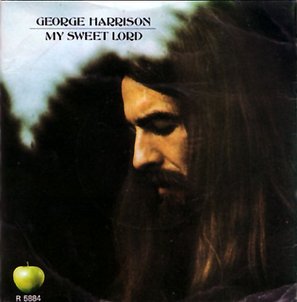 |
| "My Sweet Lord" |
"My Sweet Lord" is a song by English musician George Harrison, released in November 1970 on his triple album All Things Must Pass. It was also released as a single, Harrison's first as a solo artist, and topped charts worldwide; it was the biggest-selling single of 1971 in the UK. In America and Britain, the song was the first number-one single by an ex-Beatle. Harrison originally gave the song to his fellow Apple Records artist Billy Preston to record; this version, which Harrison co-produced, appeared on Preston's Encouraging Words album in September 1970.
Harrison wrote "My Sweet Lord" in praise of the Hindu god Krishna,while intending the lyrics as a call to abandon religious sectarianism through his blending of the Hebrew word hallelujah with chants of "Hare Krishna" and Vedic prayer. The recording features producer Phil Spector's Wall of Sound treatment and heralded the arrival of Harrison's slide guitar technique, which one biographer described as "musically as distinctive a signature as the mark of Zorro". Preston, Ringo Starr, Eric Clapton and the group Badfinger are among the other musicians on the recording.
Later in the 1970s, "My Sweet Lord" was at the centre of a heavily publicised copyright infringement suit due to its alleged similarity to the Ronnie Mack song "He's So Fine", a 1963 hit for the New York girl group the Chiffons. In 1976, Harrison was found to have subconsciously plagiarised the song, a verdict that had repercussions throughout the music industry. Rather than the Chiffons song, he said he used the out-of-copyright Christian hymn "Oh Happy Day" as his inspiration for the melody.
Harrison performed "My Sweet Lord" at the Concert for Bangladesh in August 1971, and it remains the most popular composition from his post-Beatles career. He reworked it as "My Sweet Lord (2000)" for inclusion as a bonus track on the 30th anniversary reissue of All Things Must Pass. Many artists have covered the song, including Andy Williams, Peggy Lee, Edwin Starr, Johnny Mathis, Nina Simone, Julio Iglesias, Richie Havens, Megadeth, Boy George, Elton John, Jim James, Bonnie Bramlett and Elliott Smith. "My Sweet Lord" was ranked 454th on Rolling Stone's list of "the 500 Greatest Songs of All Time" in 2004 and number 270 on a similar list published by the NME in 2014. That same year, "My Sweet Lord" was inducted into the Grammy Hall of Fame. It reached number one in Britain again when re-released in January 2002, two months after Harrison's death.
wikipedia
σε αυτόματη μετάφραση
Το "My Sweet Lord" είναι ένα τραγούδι του Άγγλου μουσικού George Harrison, που κυκλοφόρησε τον Νοέμβριο του 1970 στο τριπλό του άλμπουμ All Things Must Pass. Κυκλοφόρησε επίσης ως σινγκλ, το πρώτο του Harrison ως σόλο καλλιτέχνης και ήταν στην κορυφή των charts παγκοσμίως. ήταν το σινγκλ με τις μεγαλύτερες πωλήσεις του 1971 στο Ηνωμένο Βασίλειο. Στην Αμερική και τη Βρετανία, το τραγούδι ήταν το πρώτο νούμερο ένα σινγκλ από πρώην Beatle. Ο Harrison έδωσε αρχικά το τραγούδι στον συνάδελφό του καλλιτέχνη της Apple Records Billy Preston για να το ηχογραφήσει. αυτή η έκδοση, της οποίας συμπαραγωγός ήταν ο Χάρισον, εμφανίστηκε στο άλμπουμ του Preston's Encouraging Words τον Σεπτέμβριο του 1970.
Ο Χάρισον έγραψε το "My Sweet Lord" προς έπαινο του ινδουιστικού θεού Κρίσνα, ενώ σκόπευε τους στίχους ως κάλεσμα να εγκαταλείψουμε τον θρησκευτικό σεχταρισμό μέσω της ανάμειξης της εβραϊκής λέξης hallelujah με τα άσματα του "Χάρε Κρίσνα" και τη Βεδική προσευχή. Η ηχογράφηση περιλαμβάνει επεξεργασία Wall of Sound του παραγωγού Phil Spector και προανήγγειλε την άφιξη της τεχνικής της κιθάρας slide του Harrison, την οποία ένας βιογράφος περιέγραψε ως "μουσικά τόσο διακριτική υπογραφή όσο το σημάδι του Zorro". Οι Preston, Ringo Starr, Eric Clapton και το γκρουπ Badfinger είναι μεταξύ των άλλων μουσικών στην ηχογράφηση.
Αργότερα, στη δεκαετία του 1970, το "My Sweet Lord" βρέθηκε στο επίκεντρο μιας αγωγής για παραβίαση πνευματικών δικαιωμάτων με μεγάλη δημοσιότητα λόγω της υποτιθέμενης ομοιότητάς του με το τραγούδι του Ronnie Mack "He's So Fine", μια επιτυχία του 1963 για το συγκρότημα κοριτσιών της Νέας Υόρκης Chiffons. Το 1976, ο Χάρισον διαπιστώθηκε ότι είχε υποσυνείδητα λογοκλοπή του τραγουδιού, μια ετυμηγορία που είχε απήχηση σε όλη τη μουσική βιομηχανία. Αντί για το τραγούδι των Chiffons, είπε ότι χρησιμοποίησε τον χριστιανικό ύμνο "Oh Happy Day" που δεν ανήκει στα πνευματικά δικαιώματα ως έμπνευση για τη μελωδία.
Ο Χάρισον ερμήνευσε το "My Sweet Lord" στη Συναυλία για το Μπαγκλαντές τον Αύγουστο του 1971 και παραμένει η πιο δημοφιλής σύνθεση από την καριέρα του μετά τους Beatles. Το ξαναδούλεψε ως "My Sweet Lord (2000)" για να συμπεριληφθεί ως bonus κομμάτι στην 30η επετειακή επανέκδοση του All Things Must Pass. Πολλοί καλλιτέχνες έχουν διασκευάσει το τραγούδι, συμπεριλαμβανομένων των Andy Williams, Peggy Lee, Edwin Starr, Johnny Mathis, Nina Simone, Julio Iglesias, Richie Havens, Megadeth, Boy George, Elton John, Jim James, Bonnie Bramlett και Elliott Smith. Το "My Sweet Lord" κατατάχθηκε στην 454η λίστα του Rolling Stone με τα "500 καλύτερα τραγούδια όλων των εποχών" το 2004 και στο νούμερο 270 σε παρόμοια λίστα που δημοσιεύτηκε από το NME το 2014. Την ίδια χρονιά, το "My Sweet Lord" μπήκε στο το Grammy Hall of Fame. Έφτασε ξανά στο νούμερο ένα στη Βρετανία όταν επανακυκλοφόρησε τον Ιανουάριο του 2002, δύο μήνες μετά τον θάνατο του Χάρισον.
συνέχεια στη βικιπαίδεια
Δεν υπάρχουν σχόλια:
Δημοσίευση σχολίου